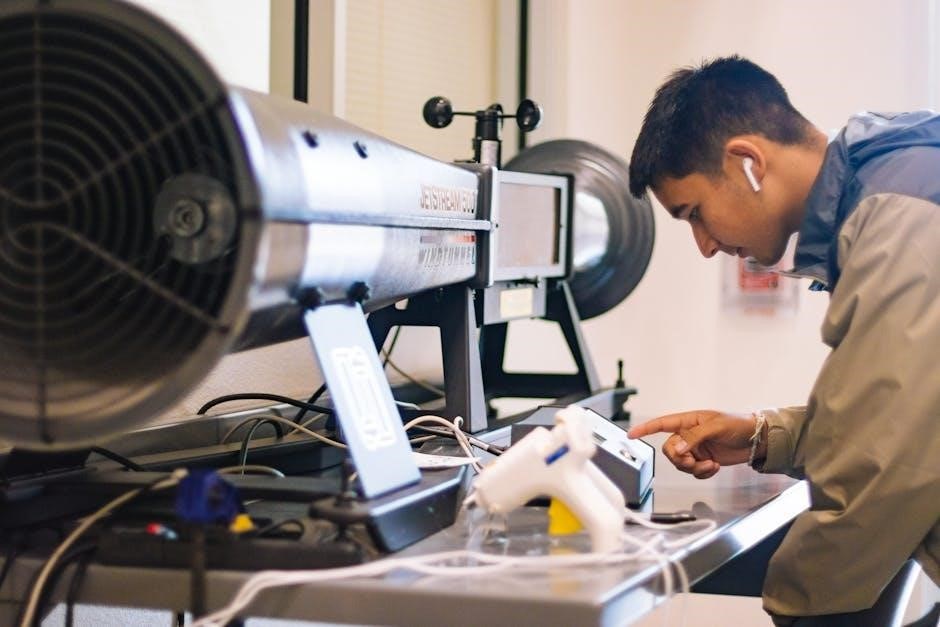The RCM Level 8 Theory Practice Exam PDF is a valuable resource for advanced students‚ offering realistic questions and detailed explanations to enhance preparation and understanding of complex theory concepts.
Overview of the RCM Level 8 Theory Exam
The RCM Level 8 Theory Exam is a comprehensive assessment designed for advanced students‚ evaluating their deep understanding of music theory concepts. It is a written exam that covers a wide range of topics‚ including harmony‚ counterpoint‚ musical analysis‚ ear training‚ and music history. The exam is divided into sections‚ each testing specific skills such as chord progressions‚ modulations‚ and analytical techniques. Aural skills are also assessed‚ requiring students to identify intervals‚ chords‚ and rhythmic patterns. The exam is typically 90 minutes long‚ and students must demonstrate precise knowledge and application of theoretical principles. Completing this exam is a significant milestone‚ as it confirms a student’s readiness for advanced musical studies or professional pursuits. Proper preparation is essential‚ as the exam demands both accuracy and the ability to think critically under time constraints.
Importance of the RCM Level 8 Theory Exam in Music Education
The RCM Level 8 Theory Exam plays a pivotal role in music education by fostering a deep understanding of theoretical concepts‚ which are essential for any musician. It sets a high standard‚ ensuring students develop a robust foundation in harmony‚ counterpoint‚ and analysis. This exam not only prepares students for advanced studies but also equips them with skills vital for professional music careers. By mastering these concepts‚ students enhance their critical thinking and analytical abilities‚ which are invaluable in composition‚ performance‚ and music appreciation. The exam serves as a benchmark for educators to assess student progress and curriculum effectiveness‚ thereby maintaining the quality of music education. Ultimately‚ it cultivates a well-rounded musician capable of excelling in various musical endeavors.
Benefits of Using Practice Exam PDFs for Preparation
Using RCM Level 8 Theory Practice Exam PDFs offers numerous advantages for students preparing for the exam. These resources provide realistic exam questions‚ enabling students to familiarize themselves with the format and content. Detailed explanations and feedback help clarify complex concepts and identify areas for improvement. Practice exams also allow students to assess their time management and exam strategies under timed conditions. Additionally‚ they build confidence by exposing students to a variety of questions‚ ensuring they are well-prepared for the actual exam. Regular use of these PDFs can enhance problem-solving skills and deepen theoretical understanding. Furthermore‚ the convenience of digital access makes it easy for students to practice anytime and anywhere‚ making these PDFs an indispensable tool for achieving success in the RCM Level 8 Theory Exam.

Structure of the RCM Level 8 Theory Exam
The RCM Level 8 Theory Exam is a comprehensive written exam assessing advanced music theory knowledge‚ focusing on harmony‚ counterpoint‚ analysis‚ ear training‚ and music history‚ with specific content requirements.
Exam Format and Timing
The RCM Level 8 Theory Exam is a written exam‚ typically held in three sessions annually: December‚ May‚ and August. Candidates are allotted 3 hours and 30 minutes to complete the exam‚ which includes both written and analytical questions. The exam assesses advanced theoretical concepts‚ such as harmony‚ counterpoint‚ and musical analysis‚ requiring detailed responses and technical accuracy. Practice exam PDFs provide students with realistic questions and timing simulations‚ helping them build time management and exam readiness. These resources are essential for familiarizing oneself with the exam structure and ensuring confidence during the actual test. Proper preparation and understanding of the format are crucial for achieving success in this challenging exam.
Key Components of the Level 8 Theory Exam
The RCM Level 8 Theory Exam comprises several critical components that test a student’s comprehensive understanding of music theory. These include harmony and counterpoint‚ where students analyze and complete complex musical passages. Musical analysis is another key section‚ requiring in-depth examination of scores and compositions. Ear training and sight singing assess aural skills and the ability to interpret music accurately. Additionally‚ music history and literature questions evaluate knowledge of major composers and stylistic periods. Each section demands precise technical skills and theoretical knowledge‚ ensuring a well-rounded assessment of a student’s musical expertise. Mastery of these components is essential for achieving a high score and demonstrating advanced proficiency in music theory.
Weightage of Different Sections in the Exam
The RCM Level 8 Theory Exam is structured with specific weightage allocated to each section to ensure a comprehensive assessment. Harmony and counterpoint typically account for a significant portion‚ followed by musical analysis and music history‚ which are also heavily weighted. Ear training and sight singing make up a smaller but essential part of the exam. The distribution ensures that students are tested on both theoretical knowledge and practical application. Understanding the weightage helps candidates prioritize their study time effectively. By focusing on higher-weight sections‚ students can maximize their scores and ensure a strong performance across all areas of the exam. This balanced approach reflects the RCM’s commitment to fostering well-rounded musical understanding.
Understanding the Grading Criteria
Understanding the RCM Level 8 Theory Exam grading criteria is essential for achieving success. The exam is evaluated based on accuracy‚ clarity‚ and adherence to musical principles. Students are assessed on their ability to demonstrate detailed knowledge of harmony‚ counterpoint‚ analysis‚ and music history. Performance standards are divided into specific grade ranges‚ with clear expectations for each level. For example‚ a score of 80-100 indicates an excellent understanding‚ while lower scores reflect areas needing improvement. Weightage is given to both technical accuracy and the quality of written responses. Penalty deductions are applied for errors such as incorrect chord progressions or misidentified musical elements. Familiarizing oneself with these criteria through practice exams helps students target their weaknesses and aim for higher scores.

Content Requirements for RCM Level 8 Theory
The RCM Level 8 Theory requires advanced understanding of harmony‚ counterpoint‚ musical analysis‚ ear training‚ and music history. Students must demonstrate mastery of complex theoretical concepts and techniques.
HARMONY AND COUNTERPOINT
Harmony and counterpoint are central to the RCM Level 8 Theory curriculum‚ requiring students to demonstrate advanced understanding of tonal harmony‚ chord progressions‚ and contrapuntal techniques. Topics include the analysis and creation of complex chord progressions‚ modulation to distant keys‚ and the use of non-chordal tones. Students must also understand and apply principles of counterpoint‚ such as voice leading‚ canon‚ and fugue. The ability to complete harmonic exercises‚ realize figured bass‚ and analyze musical excerpts is essential. Practice exams and study guides emphasize these concepts‚ providing realistic scenarios to test proficiency. Mastery of harmony and counterpoint is crucial for success in the exam‚ as it forms a significant portion of the content requirements.
MUSICAL ANALYSIS

Musical analysis is a critical component of the RCM Level 8 Theory exam‚ requiring students to demonstrate a deep understanding of musical structure‚ form‚ and stylistic characteristics. This section involves analyzing excerpts from various historical periods‚ identifying key elements such as theme development‚ harmonic progression‚ and rhythmic patterns. Students must also recognize and explain musical terminology‚ articulations‚ and performance directions. Practice exam PDFs provide opportunities to apply these skills‚ offering excerpts with varying complexities. The ability to deconstruct a piece‚ identify its components‚ and interpret its meaning is essential. Resources like the RCM Online Theory Study Guide and YouTube links to music excerpts further enhance preparation‚ allowing students to refine their analytical skills and approach exam questions with confidence.
EAR TRAINING AND SIGHT SINGING
Ear training and sight singing are essential skills assessed in the RCM Level 8 Theory exam‚ focusing on aural perception and melodic accuracy. Students are required to identify intervals‚ chords‚ scales‚ and rhythms when played‚ as well as sight sing complex melodies with precision. Practice exam PDFs include audio examples and interactive tools to refine these abilities. Resources like YouTube links provide listening examples‚ while Quizlet flashcards help reinforce aural recognition. Developing strong ear training enhances overall musicianship and supports theoretical understanding‚ making it a crucial area of study for success in the exam. Regular practice with these materials ensures students can perform and identify musical elements confidently and accurately.
MUSIC HISTORY AND LITERATURE
Music history and literature at the RCM Level 8 Theory level requires a deep understanding of historical periods‚ major composers‚ and significant works. Students must analyze musical styles‚ forms‚ and cultural contexts from the Baroque to the Contemporary era. The RCM Level 8 Theory Practice Exam PDF includes questions that test knowledge of historical development‚ composer contributions‚ and the evolution of musical genres. Resources like YouTube links provide access to recordings and analyses of key works‚ while the RCM Online Theory Study Guide offers detailed historical insights and guided analyses. Mastering this section ensures a comprehensive grasp of music’s cultural and historical significance‚ which is essential for advanced theoretical understanding and appreciation. Regular review of historical contexts and composer biographies is crucial for success in this component of the exam.

Preparation Strategies for the RCM Level 8 Theory Exam
Effective preparation involves regular practice‚ utilizing RCM study guides‚ interactive tools‚ and seeking teacher guidance to master complex concepts and ensure comprehensive understanding for success.
Mastering Key Concepts and Terminology
Mastering key concepts and terminology is essential for success in the RCM Level 8 Theory Exam. Students should focus on understanding advanced harmony‚ counterpoint‚ and musical analysis. Utilizing the RCM Online Theory Study Guide and practice exam PDFs can help reinforce these concepts. Regular review of terms like chord progressions‚ scale degrees‚ and musical forms ensures a strong foundation. Additionally‚ leveraging YouTube links for music excerpts and interactive tools can enhance understanding. Flashcards and memorization aids‚ such as those found on Quizlet‚ are also valuable for retaining terminology. Consistent practice and review of these elements will build confidence and prepare students for the exam’s challenging questions.

Effective Study Techniques for Complex Topics
Effective study techniques are crucial for tackling complex topics in the RCM Level 8 Theory Exam. Students should break down challenging concepts into manageable parts‚ focusing on one idea at a time. Using the RCM Online Theory Study Guide‚ which offers audio examples and guided analyses‚ can deepen understanding. YouTube links provide listening examples with scores‚ aiding in musical analysis; Interactive tools allow for hands-on practice‚ reinforcing theoretical knowledge. Flashcards and memorization aids‚ such as those from Quizlet‚ are excellent for retaining terminology and concepts. Regular practice and consistent review of complex topics ensure mastery. By setting specific goals and dedicating time to each section‚ students can approach the exam with confidence and precision.
Role of a Teacher in Guiding Preparation
The role of a teacher in preparing for the RCM Level 8 Theory Exam is invaluable. A qualified instructor provides personalized guidance‚ ensuring students grasp complex concepts and terminology. Teachers utilize the RCM Online Theory Study Guide to deliver structured lessons‚ often incorporating audio examples and interactive tools to enhance learning. They also recommend YouTube links for listening exercises and scores‚ helping students connect theory with practical music examples. Regular feedback and corrections from teachers are crucial for improving assignments and practice exams. Additionally‚ teachers motivate students‚ track progress‚ and tailor study plans to address individual weaknesses. Their expertise ensures that students approach the exam with confidence and a thorough understanding of the material‚ maximizing their potential for success.
Importance of Regular Practice and Revision
Regular practice and revision are essential for achieving success in the RCM Level 8 Theory Exam. Consistent review of complex concepts‚ such as harmony‚ counterpoint‚ and musical analysis‚ ensures long-term retention and deeper understanding. Utilizing RCM Level 8 Theory Practice Exam PDFs allows students to familiarize themselves with the exam format and timing‚ reducing anxiety on exam day. Regular practice helps identify weak areas‚ enabling targeted improvement. Additionally‚ revising topics like music history and ear training reinforces foundational knowledge. The cumulative effect of steady practice builds confidence and fluency‚ which are critical for tackling advanced theoretical questions. By incorporating practice exams andrevision into their routine‚ students can refine their skills and approach the exam with assurance‚ ultimately aiming for high scores and mastery of the material.

Practice Exam PDFs and Their Role in Preparation
RCM Level 8 Theory Practice Exam PDFs provide students with realistic questions and detailed explanations‚ helping them understand exam structure and improve their scores through consistent practice.
Features of RCM Level 8 Theory Practice Exam PDFs
The RCM Level 8 Theory Practice Exam PDFs are comprehensive resources designed to simulate actual exam conditions. They include realistic questions covering all exam sections‚ such as harmony‚ analysis‚ and music history‚ ensuring thorough preparation. Detailed explanations accompany each question‚ providing clarity and reinforcing understanding. The PDFs are structured to mirror the real exam format‚ helping students assess their readiness and identify areas for improvement. Additionally‚ they offer interactive tools like flashcards and progress-tracking features‚ enabling effective self-study. With their clear layout and accessibility across devices‚ these PDFs are indispensable for mastering complex theory concepts and achieving success in the RCM Level 8 exam.
How to Use Practice Exams Effectively
To maximize the benefits of RCM Level 8 Theory Practice Exam PDFs‚ students should simulate real exam conditions by setting timers and avoiding distractions. Start by thoroughly reading each question and managing time wisely to ensure all sections are attempted. After completing the exam‚ review the answers carefully‚ paying attention to explanations provided for both correct and incorrect responses. Focus on identifying weak areas and revisiting those topics in study materials. Utilize the interactive features‚ such as flashcards‚ to reinforce memorization of key terms and concepts. Regular practice with these exams helps build confidence and familiarity with the exam format‚ ensuring a more polished performance on the actual test day. Consistency in this approach is key to achieving success.
Analyzing Your Performance with Practice Exams
Analyzing your performance with RCM Level 8 Theory Practice Exam PDFs is crucial for identifying strengths and weaknesses. Start by reviewing your scores to pinpoint areas where you excelled and where improvement is needed. Examine the explanations provided for each question to understand the reasoning behind correct answers and learn from mistakes. Pay particular attention to recurring errors‚ such as chord progressions or harmonic analysis‚ and revisit those topics in your study materials. Use interactive tools‚ such as flashcards‚ to reinforce memorization of key terms and concepts. Track your progress over time to monitor improvement and adjust your study plan accordingly. Regular analysis ensures that you address gaps in knowledge and develop a deeper understanding of the material‚ leading to a more polished performance on exam day.
Common Mistakes to Avoid in Practice Exams
When preparing for the RCM Level 8 Theory Exam‚ students often make avoidable mistakes during practice exams. One common error is rushing through questions‚ leading to incorrect chord progressions or harmonic analysis. Another mistake is misinterpreting musical terms or symbols‚ which can affect analysis and ear training exercises. Additionally‚ some students overlook the importance of time management‚ resulting in incomplete answers or missed sections. To avoid these pitfalls‚ review the explanations provided in the practice exam PDFs to understand common errors. Focus on mastering key concepts‚ such as counterpoint and music history‚ and allocate sufficient time for each question. Regularly reviewing your work and seeking feedback can help you identify and correct these mistakes‚ ensuring a more polished performance on the actual exam.

Additional Resources for RCM Level 8 Theory Preparation
Utilize YouTube links for music excerpts‚ interactive tools for theory mastery‚ and Quizlet flashcards for memorizing key terms. The RCM Online Theory Study Guide also provides audio examples and guided analyses to enhance understanding.
RCM Online Theory Study Guide
The RCM Online Theory Study Guide is a comprehensive tool designed to help students master advanced theory concepts. It features audio examples‚ guided analyses‚ and step-by-step procedural breakdowns to clarify complex topics. For Levels 5 to 8‚ this resource covers eight essential units‚ ensuring a thorough understanding of harmony‚ counterpoint‚ and musical analysis. Interactive practice exams with expertly crafted hints allow students to assess their knowledge and identify areas for improvement. The guide also includes score-based listening exercises‚ enabling students to connect theoretical concepts with practical applications. This resource is particularly beneficial for Level 8 students‚ as it provides detailed explanations and practice materials tailored to the exam’s challenging requirements. By leveraging this guide‚ students can build confidence and achieve a deeper understanding of music theory.
YouTube Links for Music Excerpts and Exercises
The RCM Level 8 Theory YouTube links provide a wealth of resources for students preparing for the exam. These links offer music excerpts and exercises from each unit of the Level 8 Celebrate Theory book‚ helping students engage with the material through listening and analysis. Many videos include the score‚ allowing students to follow along and deepen their understanding of complex theory concepts. The links are time-stamped to the beginning of each excerpt‚ making it easy to navigate and focus on specific sections. These resources are particularly useful for ear training and sight singing‚ as well as for analyzing musical structures and styles. By leveraging these YouTube links‚ students can enhance their preparation and gain a more comprehensive grasp of the theory curriculum.
Interactive Tools for Theory Mastery
Interactive tools play a crucial role in mastering RCM Level 8 Theory concepts. The RCM Online Theory Study Guide offers engaging resources‚ including audio examples‚ guided analyses‚ and step-by-step breakdowns of complex topics. It also features interactive practice exams with expert hints to help students identify and correct mistakes. Additionally‚ platforms like Quizlet provide digital flashcards for memorizing key terms and concepts‚ such as chord progressions and scale degrees. These tools allow students to test their knowledge actively and receive immediate feedback‚ enhancing their understanding and retention of theory principles. By incorporating these interactive resources into their study routine‚ students can achieve a deeper mastery of the material and build confidence for the exam.
Flashcards and Memorization Aids
Flashcards are an excellent memorization aid for mastering RCM Level 8 Theory concepts. Platforms like Quizlet offer digital flashcards with key terms such as “Possible chords for the first scale degree” and “Possible chords for the second scale degree‚” helping students memorize complex theory principles. These flashcards are particularly useful for reinforcing chord progressions‚ scale degrees‚ and other essential concepts. Additionally‚ physical flashcards or apps like Anki can be used to create custom decks tailored to specific topics‚ ensuring comprehensive understanding. Regular use of these tools enhances retention and recall‚ making them indispensable for exam preparation. By leveraging flashcards‚ students can systematically review and internalize the vast amount of material required for RCM Level 8 Theory‚ ensuring they are well-prepared for the exam.

Acing the RCM Level 8 Theory Exam requires meticulous preparation and practice. Utilize practice exam PDFs to master complex concepts and stay confident for success.
Final Tips for Success in the RCM Level 8 Theory Exam

To excel in the RCM Level 8 Theory Exam‚ ensure thorough preparation by regularly practicing with RCM Level 8 Theory Practice Exam PDFs. These resources simulate real exam conditions‚ helping you manage time effectively and familiarize yourself with question formats. Focus on mastering harmony‚ counterpoint‚ and musical analysis‚ as these are critical components. Utilize YouTube links for listening exercises and interactive tools to reinforce concepts. Flashcards can aid in memorizing key terms and chord progressions. Stay calm and confident on exam day‚ carefully reading each question before answering. Allocate time to review your work‚ ensuring accuracy and completeness. By combining diligent study‚ strategic practice‚ and mental preparedness‚ you can achieve success in this advanced theory exam.
Staying Confident and Focused on Exam Day
On exam day‚ maintaining confidence and focus is crucial for success in the RCM Level 8 Theory Exam. Ensure you are well-rested and mentally prepared by getting a good night’s sleep and eating a nutritious meal. Arrive early at the exam venue to minimize stress and familiarize yourself with the surroundings. Dress comfortably and bring essential items like water‚ a pencil‚ and eraser. Stay calm by taking deep breaths and remind yourself of your thorough preparation. Read each question carefully‚ allocate time wisely‚ and avoid rushing. Trust your knowledge and approach each section systematically. A positive mindset and visualization of success can significantly boost your performance. Stay composed‚ focus on the task at hand‚ and deliver your best effort.
